
John Hansen Research Grant
The John Hansen Research Grant, known until 2019 as the Mechtild Harf Research Grants, was launched in 2015. The grants were renamed in honour of John A. Hansen, who dedicated his life’s work to the causes of graft-versus-host disease and the fight against it.
The grants are worth €240,000 (£214,000) for each recipient, spread over a period of three years.
Eligibility
Applicants must have completed their doctoral degree (PhD, MD, or equivalent achievements) within the last ten years. The research area of the project they submit should be in the field of hematopoietic stem cell transplantation and cell therapy for haematological diseases.
Further information
Discover eligibility criteria and more information for the John Hansen Research Grant, or send an email to grant@dkms.org.
John A Hansen

John A Hansen was an outstanding oncologist, an excellent immunogeneticist at the renowned Fred Hutchinson Cancer Research Center in Seattle, and a compassionate and empathetic physician. His outstanding achievements in the field of haematopoietic stem cell transplantation were instrumental in making blood stem cell and bone marrow transplants more effective and safer, giving numerous patients a second chance at life.
As a long-standing member of the Foundation Board of the DKMS Stiftung Leben Spenden (Foundation for Giving Life) and the DKMS Medical Council, Hansen was an integral part of the DKMS family. That is why, after he passed away on July 31, 2019, at the age of 76, the Mechtild Harf Research Grants were renamed in his honour.
Dr. Yiouli Ktena of Johns Hopkins University in Baltimore, one of the 2020 Fellows said,
"It is a great honour and privilege to have been awarded the John Hansen Research Grant. The grant will allow me to further my research. My goal is to use it to make stem cell transplantation safer for patients who need this powerful and life-saving form of therapy."


